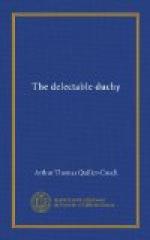We waved our hats and jolted off again towards Tregarrick. At the end of the journey the railway officials declined to charge for the pleasure of my company. But after some dispute, they agreed to compromise by adjourning to the Railway Inn, and drinking prosperity to Susan Warne’s seventh.
THE CONSPIRACY ABOARD THE MIDAS.
“Are you going home to England? So am I. I’m Johnny; and I’ve never been to England before, but I know all about it. There’s great palaces of gold and ivory—that’s for the lords and bishops—and there’s Windsor Castle, the biggest of all, carved out of a single diamond—that’s for the queen. And she’s the most beautiful lady in the whole world, and feeds her peacocks and birds of paradise out of a ruby cup. And there the sun is always shining, so that nobody wants any candles. O, words would fail me if I endeavoured to convey to you one-half of the splendours of that enchanted realm!”
This last sentence tumbled so oddly from the childish lips, that I could not hide a smile as I looked down on my visitor. He stood just outside my cabin-door—a small serious boy of about eight, with long flaxen curls hardly dry from his morning bath. In the pauses of conversation he rubbed his head with a big bath-towel. His legs and feet were bare, and he wore only a little shirt and velveteen breeches, with scarlet ribbons hanging untied at the knees.
“You’re laughing!”
I stifled the smile.
“What were you laughing at?”
“Why, you’re wrong, little man, on just one or two points,” I answered evasively.
“Which?”
“Well, about the sunshine in England. The sun is not always shining there, by any means.”
“I’m afraid you know very little about it,” said the boy, shaking his head.
“Johnny! Johnny!” a voice called down the companion-ladder at this moment. It was followed by a thin, weary-looking man, dressed in carpet slippers and a suit of seedy black. I guessed his age at fifty, but suspect now that the lines about his somewhat prim mouth were traced there by sorrows rather than by years. He bowed to me shyly, and addressed the boy.
“Johnny, what are you doing here? in bare feet!”
“Father, here is a man who says the sun doesn’t always shine in England.”
The man gave me a fleeting embarrassed glance, and echoed, as if to shirk answering—
“In bare feet!”
“But it does, doesn’t it? Tell him that it does,” the child insisted.
Driven thus into a corner, the father turned his profile, avoiding my eyes, and said dully—
“The sun is always shining in England.”
“Go on, father; tell him the rest.”
“—and the use of candles, except as a luxury, is consequently unknown to the denizens of that favoured clime,” he wound up, in the tone of a man who repeats an old, old lecture.




